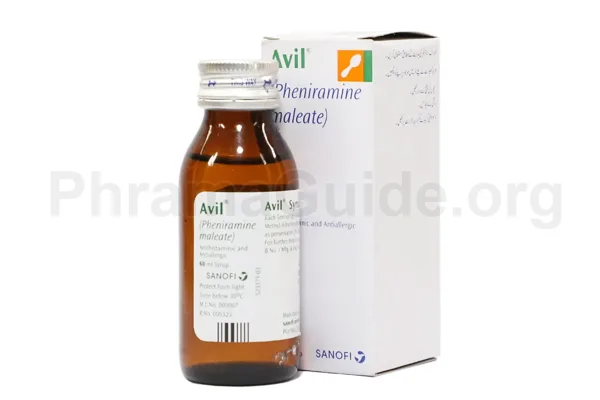Avil syrup is an antihistamine medication that is primarily used to relieve symptoms associated with allergies and allergic reactions. The following are some common uses and indications of Avil Syrup:
- Allergic Rhinitis: Avil syrup can be used to alleviate symptoms of allergic rhinitis, such as sneezing, runny nose, itching, and nasal congestion, which are often triggered by exposure to allergens like pollen, dust mites, pet dander, or mold.
- Allergic Conjunctivitis: Avil Syrup is also used to treat allergic conjunctivitis, a condition characterized by red, itchy, and watery eyes caused by exposure to allergens.
- Urticaria (Hives): Avil syrup can help relieve itching and reduce the appearance of hives caused by allergic reactions.
- Insect Bites and Stings: The use of Avil Syrup can provide relief from itching, swelling, and redness caused by insect bites or stings.
- Skin Allergies: Avil Syrup be used to alleviate itching, redness, and other skin allergy symptoms caused by contact with allergens like plants, chemicals, or certain fabrics.
- Pruritus (Itching): Using Avil Syrup is effective in relieving general itching caused by various allergic triggers.
Off-label Uses of Avil Syrup
- Cough Suppression: Avil syrup’s antihistamine properties may help reduce cough caused by postnasal drip or allergic reactions. However, it is important to note that other cough medications specifically formulated for cough suppression are more commonly used.
- Mild Motion Sickness: Avil’s antihistamine effects may help alleviate symptoms of mild motion sickness, such as nausea and dizziness. However, there are other more commonly used medications specifically designed for motion sickness.
- Sleep Aid: Avil’s sedative effects may be used off-label as a sleep aid for individuals experiencing difficulty falling asleep due to allergies or mild insomnia. However, other medications or approaches for improving sleep quality are more commonly recommended.
- Common Cold Symptoms: Avil syrup may be used to relieve symptoms associated with the common cold, such as sneezing, runny nose, and nasal congestion, although other cold remedies are more commonly used.
- Anxiety: In some cases, Avil syrup may be prescribed off-label to help manage anxiety symptoms. However, this is not a standard treatment for anxiety, and other medications or therapies are typically preferred.
- Adjunctive Therapy in Allergic Reactions: In some severe allergic reactions, Avil syrup might be used in combination with other medications to help manage symptoms and complement the treatment plan.

What is Avil?
Avil Syrup is one of the leading brands of Pheniramine in oral liquid form, manufactured and marketed by Sanofi Aventis (Pakistan) Ltd.
Avil Alternatives : Other Brands of Pheniramine
The following are some alternative brands of Avil Syrup and their manufacturers.
Allervil : Indus Pharma (Pvt) Ltd, Pakistan.
Medivil : Mediceena Pharma (Pvt) Ltd, Pakistan.
Inhistol : Life Pharmaceutical Company, Pakistan.
Avinol : Nawabsons Laboratories (Pvt) Ltd, Pakistan.
Avil : Available Formulations and Strengths
Presently, Avil is available in Syrup, Tablet, and Injection forms.
Avil Syrup : 15mg/5ml strength.
Avil Tablet : 25mg, and 50mg strengths.
Avil Injection : 22.7mg/ml strength.
Who Should Not Use Avil?
Avil syrup, like any medication, has certain contraindications, which are specific situations or conditions where its use is not recommended due to potential risks and adverse effects.
Hypersensitivity: If an individual has a known allergy or hypersensitivity to Avil or its ingredients, should be avoided.
Asthma: Avil syrup should be used with caution or avoided in individuals with a history of asthma or other respiratory conditions, as it may exacerbate breathing difficulties in some cases.
Glaucoma: Avil can increase intraocular pressure, which can be dangerous for individuals with glaucoma. Therefore, it should be avoided in people with this eye condition.
Prostatic hypertrophy: Avil may worsen symptoms in individuals with an enlarged prostate (benign prostatic hypertrophy), leading to difficulty urinating.
Bladder neck obstruction: Avil syrup should be avoided in individuals with bladder neck obstruction, as it may worsen urinary retention.
Severe liver disease: Avil is metabolized in the liver, and its use should be approached with caution or avoided in individuals with severe liver impairment.
Children under two years: Avil syrup is generally not recommended for use in children under two years of age, unless specifically prescribed by a healthcare professional.
Pregnancy and breastfeeding: The safety of Avil syrup during pregnancy and breastfeeding is not well-established. It should be used with caution during these periods, and the potential risks and benefits should be discussed with a healthcare provider.
Concurrent use with certain medications: Avil may interact with other medications, especially central nervous system depressants or alcohol, causing increased drowsiness or other adverse effects.
Recommended Daily Dosage of Avil Syrup
Avil Syrup Dose for Adults and Children (over 12 years old):
- 1 to 2 teaspoons (5-10 ml), every 4 to 6 hours, as needed to relieve allergy symptoms.
Avil Syrup Dose for Children (6 to 12 years):
- One teaspoon (5 ml), every 4 to 6 hours, as needed.
Avil Syrup Dose for Children (2 to 6 years):
- Half a teaspoon (2.5 ml), every 4 to 6 hours, as needed.
Avil Syrup Dose for Children (under 2 years):
- Avil syrup is generally not recommended for use in children under 2 years of age unless specifically prescribed by a healthcare professional.
How Avil Works?
Avil is an antihistamine medication that works by blocking the effects of histamine, a chemical released by the body in response to allergens. Its mode of action involves interfering with histamine receptors in various tissues, which helps to alleviate allergy symptoms and allergic reactions.

Leave A Comment